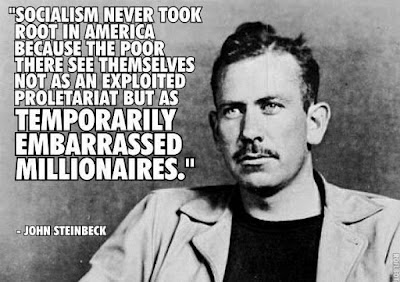A bit from Alvin Foo, a "Venture Partner," whatever that is. But it's good summary of our times. It's been said before, but maybe needs to be heard again:
"Imagine you were born in 1900.
When you're 14, World War I begins and ends when you're 18 with 22 million dead. Soon after a global pandemic, the Spanish Flu, appears, killing 50 million people. And you're alive and 20 years old.
When you're 29 you survive the global economic crisis that started with the collapse of the New York Stock Exchange, causing inflation, unemployment and famine.
When you're 33 years old the nazis come to power. When you're 39, World War II begins and ends when you're 45 years old with a 60 million dead. In the Holocaust 6 million Jews die.
When you're 52, the Korean War begins. When you're 64, the Vietnam War begins and ends when you're 75.
A child born in 1985 thinks his grandparents have no idea how difficult life is, but they have survived several wars and catastrophes. Today we have all the comforts in a new world, amid a new pandemic. But we complain because we need to wear masks. We complain because we must stay confined to our homes where we have food, electricity, running water, wifi, even Netflix! None of that existed back in the day. But humanity survived those circumstances and never lost their joy of living.
A small change in our perspective can generate miracles. We should be thankful that we are alive. We should do everything we need to do to protect and help each other."
Pain is pain and can't be compared. I get that. But I worry about my adult children's attitude towards life right now. It's great that we are all so much more aware of our feelings and to other people's experiences, but I worry we're all a little too soft for all the bad news today, for smokey days and covid and climate change and Nazis.
Everything my dad talked about when he talked about the war (WWII) is happening now. Iodine pill distribution as a precautionary measure is the most recent. It's unnerving.
I worry about this... unenlightened? generations - or maybe undarkened: those raised without direct and continuous access to someone who experienced war or hardship or who struggled, one step removed if not in the thick of it. I think it makes a different in understanding to get the little snippets of information here and there of life during difficult times, an unexpected part of daily life. My dad gave us sincere warnings about prejudice and hatred, about where it could lead. And both my parents had lots of ways of making do and saving and innovating and never wasting a single thing, having grow up at a time of rationed food and supplies. Most important, I believe, is their attitude, which they passed down to us - to most of us. They were playful and very funny and light-hearted, but always cautious and never, ever wasteful. I still save bits of string and tinfoil.
It might also explain my sense of foreboding: I was trained to be prepared for the worst.
I was unsuccessful at teaching my kids the value of doing without, of carefully measuring needs against wants, and they have many wants. For some kids today, they might starve if they can't dip their food into sauce of some kind. My introduction to pizza dip was when I realized how differently we eat today. Pizza on its own, even with loads of toppings, isn't a treat; in fact it's pretty much inedible. And food has to happen multiple times a day, not just three. The kids can't spend four straight hours working without stopping for breaks with snacks, or they need to snack while working. I feel obliged, from my father's lessons on morality, to eat all the leftovers; they would just throw them out. It's amazing how little of my lessons have seeped through. They're annoyed we don't have A/C or even a dryer. Once we finally got our first car five years ago, they started driving to see friends a block away.
This isn't a kids today post wherein I lament their behaviour, but wherein I fear for their survival. They don't know, in that internalized way, what it could be like in the very near future. They have no idea what doing without looks like. We've ushered in a society of perfectionists who need their walls the exact right shade of off-white and who might fall apart a bit if the sprinkles aren't just right on their frozen yogurt. Some argue that's all a sign of trauma, and I'm like, wha...? There's something seriously missing in that analysis. Are we absolutely sure it had nothing to do with growing up overprotected and overindulged?? Or is that what we call trauma now?
 |
| He actually said, "temporarily embarrassed capitalist" in 1960. Close enough. |
Before the war, some people were very wealthy, like today, but the difference between now and then is that those that weren't wealthy didn't expect to be any minute and didn't act like they were, buying knock-off designer things and amassing dozens of pairs of shoes. They had enough - just enough - and they enjoyed the occasional Sunday drive in the country or a picnic in the park. That's how I grew up not so long ago. I'm only in my fifties. We didn't lack for anything we needed, and wanting things was saved for Christmas. We didn't have a freezer as kids - refrigerators didn't come with them automatically back in the day, so on the odd occasion that we got a box of ice-cream, we had to eat the whole thing in one sitting. We were comfortable.
The neolibertarian competition-fueled sickness of never experiencing contentment has passed from the über rich through the other classes. The learning curve will be steep.
No comments:
Post a Comment